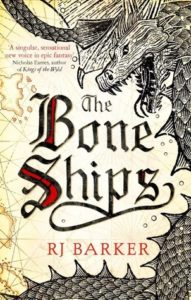
Full disclosure: nautical stories are not usually my thing, and this colors my review. But I’ve read some really good books that might not have grabbed me based on the blurb, and The Bone Ships (and its sequel, released last month) had been getting such rave reviews that I thought R.J. Barker’s offering may be worth getting out of my comfort zone.
The Bone Ships opens The Tide Child Trilogy by telling a traditional story—tough, smart, and charismatic leader whips a bunch of misfits into an effective team—in a very non-traditional setting. The Hundred Islands make up half of a known world featuring wild, dangerous seas surrounded by impassable storms. With no significant forested land, the seafaring folk construct their ships out of the bones of dragons. The seas, teeming with monsters, are the focal point of a society that flips traditional expectations on their head. Because of the prevalence of birth defects and deaths in labor, delivering healthy babies is the way to the highest honor, with the Thirteenbern (who presumably birthed thirteen healthy children) at the top of the social hierarchy as ruler. But putting the mothers in charge hasn’t led to a kind or gentle society—the Hundred Islanders practice child sacrifice, shunt the disabled into low-status jobs, and engage in an endless war with the Gaunt Islanders.
Joron Twiner is condemned to the lower classes when his mother dies in childbirth. He’s then condemned to lead the Tide Child—a ship of condemned criminals—after avenging his father’s murder, and proceeds to drink himself into oblivion and let the people on his ship do as they please. Until Lucky Meas shows up to take charge, turning the condemned riffraff into a real crew and forcing Joron to become the best version of himself, all while tracking a dragon whose bones would revive the aging fleet of whichever nation captured it.
It’s the worldbuilding that stands out here, with both natural world and society diverging sharply from the fantasy standard, and real care shown to depict them in nuanced and interesting ways. But it’s also so heavily nautical that I had more trouble appreciating it than I probably should’ve. The characters are professionally done, but I don’t see either Joron or Meas stepping too far outside the “loser who gets inspiration and becomes something” or “tough but charismatic leader” molds, and the side characters tend to run together a bit.
For me, the biggest hook was the gullaime—a sentient birdlike creature with power over the winds, whose species has been systematically blinded and enslaved by the Hundred Islanders. Not much is known about the gullaime, and they are avoided unless absolutely necessary early in the story. But as the novel progresses, we start to learn more of the Tide Child’s gullaime as an individual and more about how their species fits into the world, and those sections always snapped me back to full attention. It was here where the mysterious aspects of the worldbuilding had character implications that The Bone Ships really started to grab me.
But despite loving the gullaime subplot, The Bone Ships was a bit hit and miss for me. It feels weird to be so lukewarm on a book that seems to have hit for so many people with similar tastes to mine, but I suppose I’m just not quite the right audience here. There were clearly aspects that Barker did very well, but for all the creativity in the worldbuilding, neither the overarching plot nor the major characters stepped outside the mold long enough to keep my attention from drifting.
The Bone Ships has a fairly satisfying ending in itself, but there’s plenty of setup for the rest of the trilogy. I expect some of the subplots that I liked so much in this book will take on a bigger role in the sequels, but for me, I expect that this one might get buried under the weight of a TBR that never sleeps.
Recommended if you like: creative worldbuilding, subverting gender stereotypes, seafaring stories, misfits becoming the best versions of themselves.
Overall rating: 13 of Tar Vol’s 20. Three stars on Goodreads.
